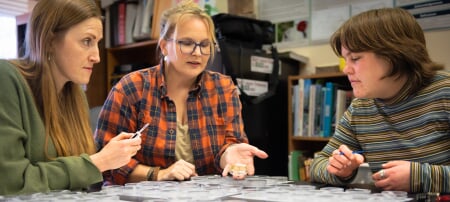Scientists ID Genes that Could Lead to Tough, Disease-Resistant Varieties of Rice

As the Earth’s human population marches toward 9 billion, the need for hardy new varieties of grain crops has never been greater.
It won’t be enough to yield record harvests under perfect conditions. In an era of climate change, pollution and the global spread of pathogens, these new grains must also be able to handle stress. Now, researchers at Michigan Technological University have identified a set of genes that could be key to the development of the next generation of super rice.
A meta-data analysis by biologist Ramakrishna Wusirika and PhD student Rafi Shaik has uncovered more than 1,000 genes in rice that appear to play key roles in managing its response to two different kinds of stress: biotic, generally caused by infectious organisms like bacteria; and abiotic, caused by environmental agents, like nutrient deficiency, flood and salinity.
Traditionally, scientists have believed that different sets of genes regulated plants’ responses to biotic and abiotic stress. However, Wusirika and Shaik discovered that 1,377 of the approximately 3,800 genes involved in rice’s stress response played a role in both types stress. “These are the genes we think are involved in the cross talk between biotic and abiotic stresses,” said Wusirika.
About 70 percent of those “master” genes are co-expressive—they turn on under both kinds of stress. Typically, the others turn on for biotic stress and turn off for abiotic stress.
The scientists looked at the genes’ response to five abiotic stresses—drought, heavy metal contamination, salt, cold and nutrient deprivation—and five biotic stresses—bacteria, fungus, insect predation, weed competition and nematodes. A total of 196 genes showed a wide range of expressions to these stresses.
“The top genes are likely candidates for developing a rice variety with broad stress-range tolerance,” Wusirika said.
Next, they would like to test their findings. “We want to do experimental analysis to see if five or 10 of the genes work as predicted,” he said.
Their study is described in the paper, “Machine Learning Approaches Distinguish Multiple Stress Conditions using Stress-Responsive Genes and Identify Candidate Genes for Broad Resistance in Rice,” published in the January edition of Plant Physiology.
Michigan Technological University is an R1 public research university founded in 1885 in Houghton, and is home to nearly 7,500 students from more than 60 countries around the world. Consistently ranked among the best universities in the country for return on investment, Michigan's flagship technological university offers more than 185 undergraduate and graduate degree programs in science and technology, engineering, computing, forestry, business, health professions, humanities, mathematics, social sciences, and the arts. The rural campus is situated just miles from Lake Superior in Michigan's Upper Peninsula, offering year-round opportunities for outdoor adventure.




Comments